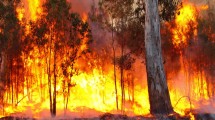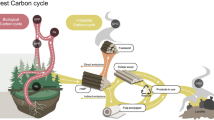Abstract
A central principle in urban ecological theory implies that in urbanized landscapes anthropogenic drivers will dominate natural drivers in the control of soil organic carbon storage (SOC). To assess the effect of urban land-use change on the storage of SOC, we compared SOC stocks of turf grass and native cover types of two metropolitan areas (Baltimore, MD, and Denver, CO) representing climatologically distinct regions in the United States. We hypothesized that introducing turf grass and management will lead to higher SOC densities in the arid Denver area and lower densities in the mesic Baltimore area relative to native cover types. Moreover, differences between turf grass soils will be less than differences between the native soils of each metropolitan region. Within Baltimore, turf grass had almost a 2-fold higher SOC density at 0- to 1-m and 0- to 20-cm depths than in rural forest soils, whereas there were no differences with soils of urban forest remnants. Moreover, urban forest remnants had more than 70% higher SOC densities than rural forest soils. Within Denver, turf grass (>25 years of age) had more than 2-fold higher SOC densities than in shortgrass steppe soils, while having similar densities to Baltimore turf grass soils. By contrast, the native soils of Baltimore were almost 2-fold higher than the native steppe grass soils of Denver using SOC densities of remnant forests as representative of native soils in the Baltimore region. These results supported our hypothesis that turf grass systems will be similar in SOC densities across regional variations in climate, parent material, and topography. These similarities are apparently due to greater management efforts in the Denver region to offset the constraint of climate, i.e., anthropogenic factors (management supplements) overwhelmed native environmental factors that control SOC storage.





Similar content being viewed by others
References
Asner GP, Seastedt TR, Townsend AR (1997) The decoupling of terrestrial carbon and nitrogen cycles. BioScience 47:226–234
Aspelin AL (1997) Pesticides industry sales and usage: 1994 and 1995 market estimates. United States Environmental Protection Agency, Washington, DC
Birdsey R (1992) Changes in forest carbon from increasing forest area and timber growth. In: Sampson RN, Hair D (eds) Forest and global change. American Forests, Washington, DC
Blake GR, Hartge KH (1986) Bulk density. In: Klute A (ed.) Methods of soil analysis, Part 1, 2nd ed., physical and mineralogical methods. Am Soc Agro, Soil Sci Soc Am J, Madison, WI
Bolstad PV, Vose JM (2005) Forest and pasture carbon pools and soil respiration in the Southern Appalachian Mountains. Forest Sci 51:372–383
Brazel A, Selover N, Vose R, Heisler G (2000) The tale of two climates—Baltimore and Phoenix urban LTER sites. Climate Res 15:123–135
Brush G, Lenk C, Smith J (1980) The natural forests of Maryland: an explanation of the vegetation map of Maryland (with 1:250,000 map). Ecol Monograph 50:77–92
Burke IC, Schimel DS, Yonker CM, Parton WJ, Joyce LA, Lauenroth WK (1990) Regional modeling of grassland biogeochemistry using GIS. Landscape Ecol 4:45–54
Burke IC, Lauenroth WK, Coffin DP (1995) Soil organic matter recovery in semiarid grasslands: implications for the conservation reserve program. Ecol Monograph 5:793–801
Cairns MA, Brown S, Helmer EH, Baumgardner GA (1997) Root biomass allocation in the world’s upland forests. Oecologia 111:1–11
Conant RT, Paustian K, Elliott ET (2001) Grassland management and conversion into grassland: effects on soil carbon. Ecol Appl 11:343–355
Culley JLB (1993) Density and compressibility. In: Carter MR (ed.) Soil sampling and methods of analysis. Can Soc of Soil Sci, Lewis., Boca Raton, FL
Doesken NJ, Pielke RAS, Bliss OAP (2003) Climate of Colorado. Climatology report number 60. Atmospheric Science Department Colorado State University, Fort Collins, CO
Effland WR, Pouyat RV (1997) The genesis, classification, and mapping of soils in urban areas. Urban Ecosystems 1:217–228
Gebhart DL, Johnson HB, Mayeuz HS, Polley HW (1994) The CRP increases in soil organic carbon. J Soil Water Conservat 49:488–492
Gill R, Burke IC, Milchunas DG, Lauenroth WK (1999) Relationship between root biomass and soil organic matter pools in the shortgrass steppe of Eastern Colorado. Ecosystems 2:226–236
Golubiewski NE (2006) Urbanization transforms prairie carbon pools: effects of landscaping in Colorado’s Front Range. Ecol Appl 16:555–571
Gordon AM, Surgeoner GA, Hall JC, Ford-Robertson JB, Vyn TJ (1996) Comments on “The Role of Turfgrasses in Environmental Protection and Their Benefits to Humans”. J Environ Qual 25:206–208
Higby JR, Bell PF (1999) Low soil nitrate levels from golf course fairways related to organic matter sink for nitrogen. Commun Soil Sci Plant Anal 30:573–588
Houghton RA, Hackler JL, Lawrence KT (1999) The U.S. carbon budget: contributions from land-use change. Science 285:574–578
Howard DM, Howard PJA, Howard DC (1995) A Markov model projection of soil organic carbon stores following land use changes. J Environ Manag 45:287–302
Jackson RB, Canadell J, Ehleringer JR, Mooney HA, Sala OE, Schulze ED (1996) A global analysis of root distribution for terrestrial biomes. Oecologia 108:389–411
Jenerette GD, Wu J, Grimm NB, Hope D (2006) Points, patches, and regions: scaling soil biogeochemical patterns in an urbanized arid ecosystem. Global Change Biol 12:1532–1544
Jobbágy EG, Jackson RB (2000) The vertical distribution of soil organic carbon and its relation to climate and vegetation. Ecol Appl 10:423–436
Kay JP, Groffman PM, Grimm NB, Baker LA, Pouyat RV (2006) A distinct urban biogeochemistry? Trends Ecol Evol 21:192–199
Kaye JP, McCulley RL, Burke IC (2005) Carbon fluxes, nitrogen cycling, and soil microbial communities in adjacent urban, native and agricultural ecosystems. Global Change Biol 11:575–587
Law NL, Band LE, Grove JM (2004) Nutrient input from residential lawn care practices. J Environ Plann Manag 47:737–755
Loeppert RH, Suarez DL (1996) Carbonate and gypsum. In: Sparks DL (ed.) Methods of soil analysis, Part 3, chemical methods. Soil Sci Soc Am and Am Soc Agro, Madison, WI
Matson PA, Parton WJ, Power AG, Swift MJ (1997) Agricultural intensification and ecosystem properties. Science 277:504–509
McCune B, Grace JB (2002) Analysis of ecological communities. MjM Software, Gleneden Beach, OR
Mestdagh I, Sleutel S, Lootens P, Cleemput OV, Carlier L (2005) Soil organic carbon stocks in verges and urban areas of Flanders, Belgium. Grass and Forage Science 60:151–156
Milesi C, Running SW, Elvidge CD, Dietz JB, Tuttle BT, Nemani RR (2005) Mapping and modeling the biogeochemical cycling of turf grasses in the United States. J Environ Manag 36:426–438
National Association of Realtors (2001) Land use and land loss in the United States: The impact of land use trends on real estate development. The Research Division of the National Association of Realtors. 9 pp
Nelson DW, Sommers LE (1996) Total carbon, organic carbon and organic matter. In: Sparks DL (ed.) Methods of soil analysis, Part 3, chemical methods. Am Soc Agro, Madison, WI
Nowak DJ, Rowntree RA, McPherson EG, Sisinni SM, Kerkmann ER, Stevens JC (1996) Measuring and analyzing urban tree cover. Landscape Urban Plann 36:49–57
Nowak DJ, Noble MH, Sisinni SM, Dwyer JF (2001) People and trees: assessing the US urban forest resource. J Forest 99:37–42
Nowak DJ, Kuroda M, Crane DE (2004) Tree mortality rates and tree population projections in Baltimore, Maryland, U.S.A. Urban Greening 2:139–147
NRCS (1998) Soil Survey of City of Baltimore, Maryland. Natural Resource Conservation Service, Washington, DC
NRCS (2004) Soil survey laboratory methods manual. In: Burt R (ed.) Soil Survey Investigations Report No. 42, version 4.0. Natural Resource Conservation Service, Washington, DC
Pataki DE, Alig RJ, Fung AS, Golubiewski NE, Kennedy CA, McPherson EG, Nowak DJ, Pouyat RV, Lankao PR (2006) Urban ecosystems and the North American carbon cycle. Global Change Biol 12:1–11
Post WM (2003) Impact of soil restoration, management, and land-use history on forest-soil carbon. In: Kimble JM, Heath LS, Birdsey RA, Lal R (eds.) The potential of U.S. forest soils to sequester carbon and mitigate the greenhouse effect. CRC, Boca Raton, FL
Post WM, Kwon KC (2000) Soil carbon sequestration and land-use change: processes and potential. Global Change Biol 6:317–327
Post WM, Mann LK (1990) Changes in soil organic carbon and nitrogen as a result of cultivation. In: Bouwman AF (ed.) Soils and the greenhouse effect. Wiley, Chichester, England
Post WM, Emanuel WR, Zinke PJ, Stangenberger AG (1982) Soil carbon pools and world life zones. Nature 298:156–159
Pouyat R, Groffman P, Yesilonis I, Hernandez L (2002) Soil carbon pools and fluxes in urban ecosystems. Environ Pollut 116:S107–S118
Pouyat RV, Russell-Anelli J, Yesilonis ID, Groffman PM (2003) Soil carbon in urban forest ecosystems. In: Kimble JM, Heath LS, Birdsey RA, Lal R (eds.) The potential of U.S. forest soils to sequester carbon and mitigate the greenhouse effect. CRC, Boca Raton, FL
Pouyat RV, Yesilonis I, Nowak DJ (2006) Carbon storage by urban soils in the USA. J Environ Qual 35:1566–1575
Pouyat RV, Yesilonis ID, Russell-Anelli J, Neerchal NK (2007) Soil chemical and physical properties that differentiate urban land-use and cover. Soil Sci Soc Am J 71:1010–1019
Qian YL, Follett RF (2002) Assessing soil carbon sequestration in turfgrass systems using long-term soil testing data. Agron J 94:930–935
Qian YL, Bandaranayake W, Parton WJ, Mecham B, Harivandi MA, Mosier AR (2003) Long-term effects of clipping and nitrogen management in turfgrass on soil organic carbon and nitrogen dynamics: the CENTURY model simulation. J Environ Qual 32:1694–1700
SAS Institute (2003) The SAS system for Windows. Release 9.1. SAS Inst., Cary, NC
Schimel DS, Stillwell MA, Woodmansee RG (1985) Biogeochemistry of C, N, and P in a soil catena of the shortgrass steppe. Ecology 66:276–282
Schneider DW (1996) Effects of European settlement and land use on regional patterns of similarity among Chesapeake forests. Bull Torrey Bot Club 123:223–239
Sims PL, Singh JS (1978) The structure and function of ten western North American grasslands. III. Net primary production, turnover and efficiencies of energy capture and water use. J Ecol 66:573–597
Vitousek PM, D’antonio CM, Loope LL, Rejmanek M, Westbrooks R (1997) A significant component of human-caused global change. New Zeal J Ecol 21:1–16
West TO, Six J (2007) Considering the influence of sequestration duration and carbon saturation on estimates of soil carbon capacity. Climatic Change 80:25–41
Yonker CM, Schimel DS, Paroussis E, Heil RD (1988) Patterns of organic carbon accumulation in semiarid shortgrass steppe. Soil Sci Soc Am J 52:478–483
Acknowledgments
We thank an anonymous reviewer and S. Schwartz for their comments on this manuscript. Funding support came from the USDA Forest Service, Northern Global Change Program and Research Work Unit (NE-4952), Syracuse, NY; Baltimore Ecosystem Study’s Long Term Ecological Research grant from the National Science Foundation (Grant No. 0423476); and the Center for Urban Environmental Research and Education, University of Maryland Baltimore County grant from the Environmental Protection Agency (R-82818204). Any opinions, findings, and conclusions or recommendations expressed in this material are those of the author(s) and do not necessarily reflect the views of the National Science Foundation.
Author information
Authors and Affiliations
Corresponding author
Rights and permissions
About this article
Cite this article
Pouyat, R.V., Yesilonis, I.D. & Golubiewski, N.E. A comparison of soil organic carbon stocks between residential turf grass and native soil. Urban Ecosyst 12, 45–62 (2009). https://doi.org/10.1007/s11252-008-0059-6
Received:
Accepted:
Published:
Issue Date:
DOI: https://doi.org/10.1007/s11252-008-0059-6




